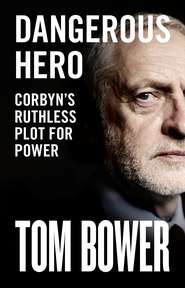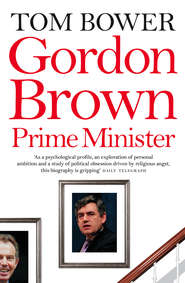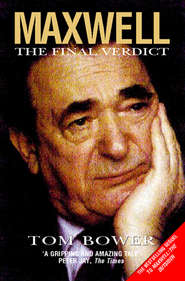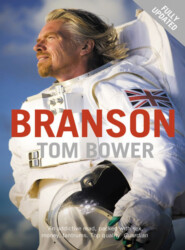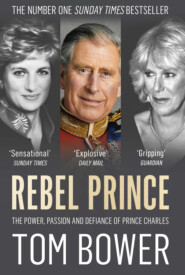По всем вопросам обращайтесь на: info@litportal.ru
(©) 2003-2024.
✖
The Squeeze: Oil, Money and Greed in the 21st Century
Автор
Год написания книги
2019
Настройки чтения
Размер шрифта
Высота строк
Поля
The Squeeze: Oil, Money and Greed in the 21st Century
Tom Bower
The sensational human story of the hunt for oil, and the politics, power and personalities involved.Over the last 20 years, oil prices have soared from $7 a barrel to $147 and down to $37. Amid economic boom and bust, speculators, traders, politicians and monarchs have plotted to earn fortunes from oil, and prayed for salvation from unpredictable natural and man-made disasters. Behind the headlines are the crushing rivalries between men and women exploring for oil five miles beneath the sea, battling for control of the world's biggest corporations and gambling billions of dollars twenty-four hours every day on oil prices. Success or failure for all those extraordinary personalities depends on squeezing their rivals and squeezing the crude out of the rocks. Overweening vanity and greed absorb those titans whose ambitions are forging the world's quest for oil.Exploiting unprecedented close access to the lives of irrepressible traders in New York, oil-oligarchs in Moscow, corporate chieftains in Dallas and London, and wily politicians floating in jets across the globe, Tom Bower presents the untold story of the most important quandary of our times: why, if there is plentiful oil in the earth, does mankind face a dire shortage threatening our lives? Self-interest is propelling the squeeze and there seems to be no salvation.
TOM BOWER
The Squeeze
Oil, Money and Greed in the Twenty-First Century
DEDICATION (#ulink_bdced6ee-1489-5bd2-b379-1d8663026fc6)
To George and Sylvia Bower
CONTENTS
Cover (#u6bdf5091-b117-5efd-9b2b-c95ceccbf44b)
Title Page (#u0b6d728a-f408-5764-9df1-c6b68cc9a7a4)
Dedication (#uda5e4d02-8bad-5acb-96a0-936e1ee9af9a)
Preface (#u125cdc95-1f97-5ae7-b54e-5c132c3848f0)
1. The Emperor (#u2c6fbed5-52da-58d3-b405-1e4fd5c75064)
2. The Explorer (#u4e1c4a17-5293-520a-9a71-730e2dcc93d6)
3. The Master Trader (#u8fd19125-96f0-5dd5-a448-5d5960fe2608)
4. The Casualty (#u403622d6-6c89-5d22-8508-3e69597dc7b8)
5. The Star (#u1ddb03c3-0d1a-5e0c-8d52-e20b08eda4bb)
6. The Booty Hunters (#u43d303cf-7da9-5177-8eb0-f6f927555239)
7. The Oligarchs (#litres_trial_promo)
8. The Suspect Traders (#litres_trial_promo)
9. The Crisis (#litres_trial_promo)
10. The Hunter (#litres_trial_promo)
11. The Aggressors (#litres_trial_promo)
12. The Antagonists (#litres_trial_promo)
13. The Shooting Star (#litres_trial_promo)
14. The Twister (#litres_trial_promo)
15. The Gamble (#litres_trial_promo)
16. The Downfall (#litres_trial_promo)
17. The Alarm (#litres_trial_promo)
18. The Struggle (#litres_trial_promo)
19. The Survivor (#litres_trial_promo)
20. The Backlash (#litres_trial_promo)
21. The Confession (#litres_trial_promo)
22. The Oligarch’s Squeeze (#litres_trial_promo)
23. The Frustrated Regulator (#litres_trial_promo)
Acknowledgements (#litres_trial_promo)
Index (#litres_trial_promo)
Notes (#litres_trial_promo)
By the Same Author (#litres_trial_promo)
Copyright (#litres_trial_promo)
About the Publisher (#litres_trial_promo)
PREFACE (#ulink_65866856-cfcf-50ac-ab4d-8a0e41f05795)
VIENNA, 28 MAY 2009
Despite the crowds of journalists and TV cameras jostling in the small entrance hall of OPEC’s Vienna headquarters, the atmosphere was mellow. After the frenzy of oil prices soaring and then crashing during 2008, the arrival of Ali al-Naimi, the dapper Saudi oil minister, seemed undramatic. The small man was smiling after his 20-minute walk from the Grand Hotel, but his serenity was deceptive. Known as ‘Mr OPEC’, or the leader of the Organisation of Petroleum Exporting Countries, al-Naimi had uncharacteristically sought publicity before the 11 members of the price-fixing cartel began their 153rd meeting that morning.
‘We think prices will rise,’ he had puffed during a 6 a.m. run along the Baroque Ringstrasse the previous day. As usual, he was seeking to influence the markets in New York and London. To his satisfaction, over the next 24 hours speculators had bid up oil prices by $1 to $63 a barrel, a 100 per cent increase in eight months. Over the next weeks, al-Naimi hoped, if the speculators could be persuaded, prices would rise by another $20; and then by a further $70 to $150, an all-time high. Billions of dollars had flowed from the Western countries into the oil producers’ coffers in previous years, but al-Naimi was determined to defy economic law. Demand for oil had fallen since the crash in July 2008, record amounts of oil were in storage, and the world had plunged into recession. Yet he was talking up prices. If he was to succeed, he would have to persuade the other OPEC members, an exclusive but quarrelsome club, to endorse his strategy.
Unlike the exotic pageant of presidents and kings who had attended OPEC’s meetings during the 1970s, the 10 ministers and their aides who followed al-Naimi into the shiny office block were colourless placemen. Journalists no longer witnessed dramas like Saddam Hussein embracing his bitter enemy the Shah of Iran in 1975 while the stylish Sheikh Yamani, al-Naimi’s predecessor as the Saudi oil minister, hovered in the background. In those days, the dictators posed as brokers of the world’s future. Having wrested control of their oil from the cabal of dominant Western companies known as the Seven Sisters, the OPEC countries had freed themselves of the imperialist, and occasionally racist, attitudes that had formerly dictated their fates. The American and British corporations, blamed for their wilful blindness about realities in West Africa, Central America and the Arab world, had ceased to be the guardians of the common destiny.
Nevertheless, oil remained the world’s biggest business. Every aspect of mankind’s lives depended on the refinement of crude oil into energy, plastics, chemicals and drugs. For a century the commodity has been on a rollercoaster, swinging from surplus to shortage. Cheap oil has fuelled booms while high prices have plunged the world into recession. Finding a balance has been elusive. Always the target of mistrust, oil has now become a tougher, more unpredictable business than ever before.
In 1975 Anthony Sampson, the redoubtable author of The Seven Sisters, a groundbreaking description of the relationship between the seven major oil companies and OPEC, described the Arab – Israeli war of 1973 as the ‘last battle (#litres_trial_promo)’ to control the industry. ‘The fascination of (#litres_trial_promo) oil history,’ he wrote, ‘lies in the ever changing form of the battle to control supply.’ Focused on the ‘collision course’ between the governments of the oil producers, the oil companies and the governments in Washington and London, Sampson, like others, did not anticipate Iraq waging war against neighbouring Iran and Kuwait, or that America would twice lead invasions of Iraq, characterised by some as ‘blood for oil’. He would have been struck, as I was, by the candour of the vice president of one of America’s biggest oil companies whom I asked in passing in 2007, ‘Was George W. Bush’s invasion of Iraq about oil?’ He replied, ‘Absolutely, yes.’ Some argue that the ideological Cold War has been replaced by ‘resource wars’. In Sampson’s era, the ‘resource war’ revolved around disputes about prices between the oil companies and OPEC.
In the two years after the 1973 Arab – Israeli war, the OPEC leaders defied American forecasts that their cartel would collapse, because the consequence of oil prices quadrupling would be a recession in the West. But OPEC’s defiance was rewarded, and despite the nationalisation of many Western-owned oilfields, the unnerved oil companies collaborated with their expropriators. Stripped of their mystique and their arrogance, the American and British giants were transformed into paper tigers. Anxious to guarantee oil supplies and to maintain their share of markets, the companies that had discovered and developed the oilfields and refined the crude became supplicants. To many, OPEC’s ascendancy appeared to be irreversible. Only a few wise oil men mentioned the fact that cycles never changed. Permanently fixing the market was beyond any mortal, even the OPEC nations.
By 1990, OPEC’s lurking threat had indeed diminished. The procession of technocrats following Ali al-Naimi to the second floor of OPEC’s headquarters understood that oil had become democratised: prices were set by traders in New York’s and London’s markets rather than by OPEC’s edict. Yet, even though they were no longer brokering mankind’s destiny, the ministers retained control of 40 per cent of the world’s oil supplies – sufficient to wield considerable influence.
Tom Bower
The sensational human story of the hunt for oil, and the politics, power and personalities involved.Over the last 20 years, oil prices have soared from $7 a barrel to $147 and down to $37. Amid economic boom and bust, speculators, traders, politicians and monarchs have plotted to earn fortunes from oil, and prayed for salvation from unpredictable natural and man-made disasters. Behind the headlines are the crushing rivalries between men and women exploring for oil five miles beneath the sea, battling for control of the world's biggest corporations and gambling billions of dollars twenty-four hours every day on oil prices. Success or failure for all those extraordinary personalities depends on squeezing their rivals and squeezing the crude out of the rocks. Overweening vanity and greed absorb those titans whose ambitions are forging the world's quest for oil.Exploiting unprecedented close access to the lives of irrepressible traders in New York, oil-oligarchs in Moscow, corporate chieftains in Dallas and London, and wily politicians floating in jets across the globe, Tom Bower presents the untold story of the most important quandary of our times: why, if there is plentiful oil in the earth, does mankind face a dire shortage threatening our lives? Self-interest is propelling the squeeze and there seems to be no salvation.
TOM BOWER
The Squeeze
Oil, Money and Greed in the Twenty-First Century
DEDICATION (#ulink_bdced6ee-1489-5bd2-b379-1d8663026fc6)
To George and Sylvia Bower
CONTENTS
Cover (#u6bdf5091-b117-5efd-9b2b-c95ceccbf44b)
Title Page (#u0b6d728a-f408-5764-9df1-c6b68cc9a7a4)
Dedication (#uda5e4d02-8bad-5acb-96a0-936e1ee9af9a)
Preface (#u125cdc95-1f97-5ae7-b54e-5c132c3848f0)
1. The Emperor (#u2c6fbed5-52da-58d3-b405-1e4fd5c75064)
2. The Explorer (#u4e1c4a17-5293-520a-9a71-730e2dcc93d6)
3. The Master Trader (#u8fd19125-96f0-5dd5-a448-5d5960fe2608)
4. The Casualty (#u403622d6-6c89-5d22-8508-3e69597dc7b8)
5. The Star (#u1ddb03c3-0d1a-5e0c-8d52-e20b08eda4bb)
6. The Booty Hunters (#u43d303cf-7da9-5177-8eb0-f6f927555239)
7. The Oligarchs (#litres_trial_promo)
8. The Suspect Traders (#litres_trial_promo)
9. The Crisis (#litres_trial_promo)
10. The Hunter (#litres_trial_promo)
11. The Aggressors (#litres_trial_promo)
12. The Antagonists (#litres_trial_promo)
13. The Shooting Star (#litres_trial_promo)
14. The Twister (#litres_trial_promo)
15. The Gamble (#litres_trial_promo)
16. The Downfall (#litres_trial_promo)
17. The Alarm (#litres_trial_promo)
18. The Struggle (#litres_trial_promo)
19. The Survivor (#litres_trial_promo)
20. The Backlash (#litres_trial_promo)
21. The Confession (#litres_trial_promo)
22. The Oligarch’s Squeeze (#litres_trial_promo)
23. The Frustrated Regulator (#litres_trial_promo)
Acknowledgements (#litres_trial_promo)
Index (#litres_trial_promo)
Notes (#litres_trial_promo)
By the Same Author (#litres_trial_promo)
Copyright (#litres_trial_promo)
About the Publisher (#litres_trial_promo)
PREFACE (#ulink_65866856-cfcf-50ac-ab4d-8a0e41f05795)
VIENNA, 28 MAY 2009
Despite the crowds of journalists and TV cameras jostling in the small entrance hall of OPEC’s Vienna headquarters, the atmosphere was mellow. After the frenzy of oil prices soaring and then crashing during 2008, the arrival of Ali al-Naimi, the dapper Saudi oil minister, seemed undramatic. The small man was smiling after his 20-minute walk from the Grand Hotel, but his serenity was deceptive. Known as ‘Mr OPEC’, or the leader of the Organisation of Petroleum Exporting Countries, al-Naimi had uncharacteristically sought publicity before the 11 members of the price-fixing cartel began their 153rd meeting that morning.
‘We think prices will rise,’ he had puffed during a 6 a.m. run along the Baroque Ringstrasse the previous day. As usual, he was seeking to influence the markets in New York and London. To his satisfaction, over the next 24 hours speculators had bid up oil prices by $1 to $63 a barrel, a 100 per cent increase in eight months. Over the next weeks, al-Naimi hoped, if the speculators could be persuaded, prices would rise by another $20; and then by a further $70 to $150, an all-time high. Billions of dollars had flowed from the Western countries into the oil producers’ coffers in previous years, but al-Naimi was determined to defy economic law. Demand for oil had fallen since the crash in July 2008, record amounts of oil were in storage, and the world had plunged into recession. Yet he was talking up prices. If he was to succeed, he would have to persuade the other OPEC members, an exclusive but quarrelsome club, to endorse his strategy.
Unlike the exotic pageant of presidents and kings who had attended OPEC’s meetings during the 1970s, the 10 ministers and their aides who followed al-Naimi into the shiny office block were colourless placemen. Journalists no longer witnessed dramas like Saddam Hussein embracing his bitter enemy the Shah of Iran in 1975 while the stylish Sheikh Yamani, al-Naimi’s predecessor as the Saudi oil minister, hovered in the background. In those days, the dictators posed as brokers of the world’s future. Having wrested control of their oil from the cabal of dominant Western companies known as the Seven Sisters, the OPEC countries had freed themselves of the imperialist, and occasionally racist, attitudes that had formerly dictated their fates. The American and British corporations, blamed for their wilful blindness about realities in West Africa, Central America and the Arab world, had ceased to be the guardians of the common destiny.
Nevertheless, oil remained the world’s biggest business. Every aspect of mankind’s lives depended on the refinement of crude oil into energy, plastics, chemicals and drugs. For a century the commodity has been on a rollercoaster, swinging from surplus to shortage. Cheap oil has fuelled booms while high prices have plunged the world into recession. Finding a balance has been elusive. Always the target of mistrust, oil has now become a tougher, more unpredictable business than ever before.
In 1975 Anthony Sampson, the redoubtable author of The Seven Sisters, a groundbreaking description of the relationship between the seven major oil companies and OPEC, described the Arab – Israeli war of 1973 as the ‘last battle (#litres_trial_promo)’ to control the industry. ‘The fascination of (#litres_trial_promo) oil history,’ he wrote, ‘lies in the ever changing form of the battle to control supply.’ Focused on the ‘collision course’ between the governments of the oil producers, the oil companies and the governments in Washington and London, Sampson, like others, did not anticipate Iraq waging war against neighbouring Iran and Kuwait, or that America would twice lead invasions of Iraq, characterised by some as ‘blood for oil’. He would have been struck, as I was, by the candour of the vice president of one of America’s biggest oil companies whom I asked in passing in 2007, ‘Was George W. Bush’s invasion of Iraq about oil?’ He replied, ‘Absolutely, yes.’ Some argue that the ideological Cold War has been replaced by ‘resource wars’. In Sampson’s era, the ‘resource war’ revolved around disputes about prices between the oil companies and OPEC.
In the two years after the 1973 Arab – Israeli war, the OPEC leaders defied American forecasts that their cartel would collapse, because the consequence of oil prices quadrupling would be a recession in the West. But OPEC’s defiance was rewarded, and despite the nationalisation of many Western-owned oilfields, the unnerved oil companies collaborated with their expropriators. Stripped of their mystique and their arrogance, the American and British giants were transformed into paper tigers. Anxious to guarantee oil supplies and to maintain their share of markets, the companies that had discovered and developed the oilfields and refined the crude became supplicants. To many, OPEC’s ascendancy appeared to be irreversible. Only a few wise oil men mentioned the fact that cycles never changed. Permanently fixing the market was beyond any mortal, even the OPEC nations.
By 1990, OPEC’s lurking threat had indeed diminished. The procession of technocrats following Ali al-Naimi to the second floor of OPEC’s headquarters understood that oil had become democratised: prices were set by traders in New York’s and London’s markets rather than by OPEC’s edict. Yet, even though they were no longer brokering mankind’s destiny, the ministers retained control of 40 per cent of the world’s oil supplies – sufficient to wield considerable influence.







